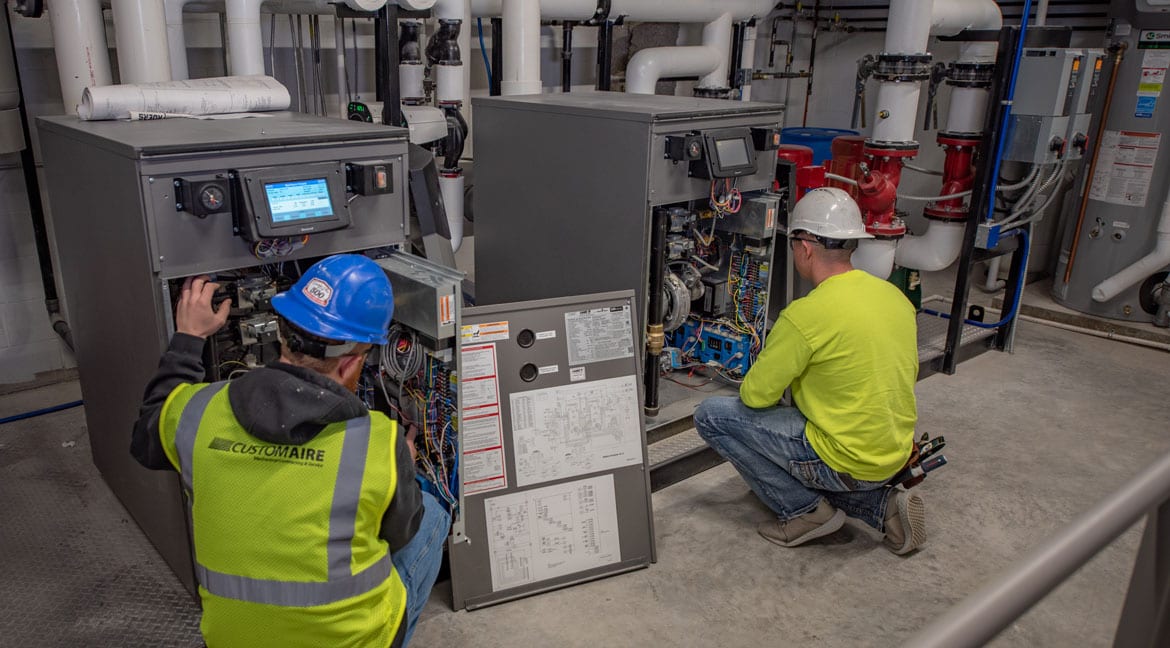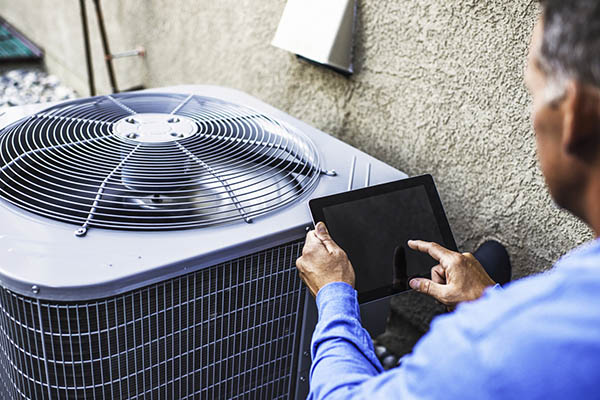Selecting Between a Warmth Pump and Heater: Key Considerations for Your Cooling And Heating Needs
When assessing heating choices for a/c requires, the decision between a heat pump and a furnace can be complex. Each system offers distinct advantages customized to details environments and energy effectiveness goals. Comprehending these differences is necessary for making an enlightened option. Secret elements such as installation prices and ecological effect even more complicate the option process. Which alternative genuinely straightens with one's convenience and sustainability preferences? The following areas will certainly check out these considerations carefully.
Recognizing Heat Pumps: How They Function and Their Benefits
While many homeowners consider numerous heating alternatives, recognizing how heatpump function and their benefits can substantially affect their decision. Heatpump operate by transferring heat instead than producing it. In the winter season, they draw out heat from the outside air or ground and transfer it inside your home, while in the summer, they reverse this process, cooling down the home by expelling heat outside. This double functionality makes them versatile for year-round climate control.One of the main benefits of heatpump is their power performance. They use substantially much less electrical energy compared to traditional heating systems, possibly resulting in reduced energy expenses (heat pump replacement ooltewah tn). Furthermore, warmth pumps have a smaller carbon footprint, making them an eco-friendly selection. They additionally call for much less upkeep than conventional systems, adding to lasting expense financial savings. Overall, understanding the technicians and benefits of heatpump can assist home owners make informed decisions regarding their home heating and cooling requirements
Discovering Heating Systems: Kinds, Operation, and Benefits
Heating systems can be found in different kinds, including gas, electric, and oil models, each with unique operational devices. Understanding these differences is necessary, as they influence effectiveness and heating efficiency. Additionally, heaters provide various benefits, such as constant heat outcome and reliability in chillier climates.
Kinds of Heating systems
Home heating systems can vary considerably in style and procedure, with heating systems being a popular choice among home owners. There are a number of sorts of furnaces, each making use of different gas sources and modern technologies. Gas heating systems prevail, leveraging gas to generate heat effectively. Electric furnaces, on the other hand, use electrical resistance to generate heat, often favored for their straightforward setup. Oil heaters, while much less common, work in locations with minimal gas gain access to (heat pump installation ooltewah tn). Furthermore, condensing heaters maximize power performance by recording and recycling exhaust gases. Each type runs via a system of warm exchangers and ductwork to disperse cozy air throughout a home. Comprehending the distinctions in between these heater kinds is essential for notified HVAC decisions
Advantages of Heating systems
For home owners looking for dependable heat throughout cold months, the advantages of furnaces are substantial. Heating systems offer regular home heating, making sure also temperatures throughout the home. They are specifically reliable in extreme cool, usually surpassing heat pumps in icy conditions. Various kinds, including gas, electrical, and oil heating systems, provide versatility to satisfy diverse requirements and preferences.Furnaces additionally tend to have lower initial installation expenses contrasted to warmth pumps, making them an extra easily accessible option for many. Their robust layout adds to a longer life expectancy, with several systems lasting over 15 years with correct maintenance. Furthermore, modern heaters are typically equipped with innovative technology for boosted performance, which can cause reduced energy costs. Overall, furnaces stay a reliable choice for efficient home heating.

Energy Effectiveness: Comparing Heat Pumps and Furnaces
When comparing energy effectiveness in between warmth pumps and heaters, the Seasonal Power Effectiveness Ratio (SEER) plays a necessary duty in determining performance. In addition, a functional cost analysis exposes the long-lasting monetary ramifications of each system. Comprehending these elements can lead house owners in making informed choices about their heating remedies.
Seasonal Power Efficiency Ratio
Power performance plays a crucial function in the decision-making procedure between warmth pumps and heaters, particularly when considering the Seasonal Energy Performance Ratio (SEER) This statistics measures the cooling effectiveness of warm pumps over a whole cooling season, giving a standard way to examine performance. Greater SEER rankings indicate better power effectiveness, equating to reduced power consumption and lowered utility expenses. In comparison, heating systems are commonly evaluated making use of the Yearly Fuel Use Efficiency (AFUE) rating, which reflects home heating performance. When comparing these 2 systems, homeowners need to prioritize SEER scores for heat pumps, as they straight effect total power savings and ecological sustainability. An extensive understanding of SEER can notably affect the lasting contentment and cost-effectiveness of the chosen HVAC option.
Operational Expense Evaluation
Comprehending the functional prices associated with heat pumps and heaters is essential for property owners reviewing their choices. Heatpump typically provide greater power effectiveness, transforming electric energy into heat with minimal waste. This results in lower monthly energy costs, specifically in modest climates. Conversely, standard heating systems, specifically gas versions, might have lower ahead of time expenses yet can sustain greater operational expenses with time because of fuel prices and effectiveness ratings.Moreover, heatpump can function as both home heating and cooling down systems, potentially reducing the demand for different cooling and heating devices. While first financial investments for warmth pumps might be higher, their long-term savings in power performance can make them an extra affordable option for numerous households. Careful analysis of local my review here power rates is necessary to figure out the finest option.
Installment Costs: What to Anticipate for Each Home Heating System
Setup expenses for home heating systems can differ considerably in between heatpump and furnaces, affecting home owners' decisions. Warmth pumps typically have higher in advance setup costs, normally varying from $3,500 to $8,000, depending on the system dimension and intricacy of setup. This includes the outside unit, interior handling system, and required ductwork alterations. On the other hand, heaters tend to have reduced initial expenses, balancing between $2,500 and $6,000, which can be appealing for budget-conscious house owners. However, installment expenditures can enhance if considerable ductwork is required.Moreover, the choice of fuel type for heaters-- gas, propane, or electric-- can likewise affect installment prices. While heatpump provide power effectiveness, their preliminary financial investment might hinder some customers. Eventually, examining setup prices alongside lasting financial savings and effectiveness will certainly aid home owners in making informed choices concerning their heating unit.
Environment Considerations: Which System Performs Better in Your Location
Just how do environment problems affect the effectiveness of home heating systems? The efficiency of heatpump and heaters can differ substantially depending on the neighborhood environment. In moderate climates, warmth pumps excel by effectively transferring warmth from the outdoors air, making them an energy-saving choice. Their performance diminishes in very cold temperature levels, where they might have a hard time to extract adequate warm. Alternatively, furnaces, particularly gas versions, offer consistent and reputable heat no matter of outdoor conditions, making them preferable in colder regions.In locations that experience milder wintertimes, heatpump can run effectively year-round, providing both cooling and heating. In contrast, areas with rough winter seasons often take advantage of the robustness of heaters. Ultimately, understanding the neighborhood environment is crucial when determining in between a heat pump and a heating system, as it directly influences their functional performance and total performance.
Upkeep Requirements: Long-Term Look After Warm Pumps vs. Furnaces
While both warm pumps and furnaces call for normal maintenance to guarantee peak efficiency, their certain needs and treatment regimens differ significantly. Heating systems commonly require less regular interest, with yearly examinations sufficing to look for gas leaks, tidy filters, and assess general capability. Their easier design often enables simple repairs.In comparison, heatpump necessitate semiannual maintenance because of their double role in cooling and heating. This includes cleansing coils, inspecting refrigerant levels, and guaranteeing that both the exterior and interior units operate at their best. Furthermore, warmth pump maintenance usually includes even more detailed components, making expert maintenance essential.Neglecting maintenance can cause lessened performance and increased energy prices for both systems. Eventually, property owners ought to consider these long-term treatment requirements when picking in between a heatpump and a heater, as aggressive upkeep can extend the life expectancy and efficiency of either system considerably.
Environmental Effect: Selecting a Lasting Home Heating Alternative
The ecological influence of heating systems is a critical analysis for homeowners seeking sustainable options. Heat pumps are usually much more energy-efficient than conventional heating systems, as they transfer heat as opposed to generate it, significantly decreasing carbon discharges. By using sustainable energy sources, such as geothermal or air-source heatpump, property owners can even more reduce their environmental footprint.On the other hand, gas furnaces give off greenhouse gases and contribute to air pollution, though they typically provide higher warm output. Improvements in innovation have actually led to the advancement of high-efficiency have a peek at this website furnaces that decrease emissions.Ultimately, choosing a home heating system includes weighing performance against ecological impact. Home owners are encouraged to assess regional power sources and motivations for renewable systems, making certain an option that straightens with both individual comfort and environmental duty. The decision affects not only immediate comfort but also long-term sustainability and environmental health and wellness.
Regularly Asked Inquiries
How Lengthy Do Warm Pumps and Furnaces Generally Last?
The life expectancy of heat pumps normally varies from 15 to 20 years, while heaters can last in between 15 to 30 years. Routine maintenance substantially influences their longevity and performance in Related Site supplying home heating solutions.
Can I Utilize a Heatpump in Exceptionally Cold Climates?
Heatpump can operate in incredibly chilly environments, yet their performance diminishes as temperatures decrease. In such problems, supplemental home heating resources may be required to keep comfortable indoor temperature levels and guarantee peak performance.

What Is the Sound Degree of Heat Pumps Versus Furnaces?
The noise degrees of warmth pumps and furnaces vary significantly. Usually, heat pumps operate even more silently than standard heating systems, making them more suitable for those delicate to seem, while heating systems might generate louder functional sounds throughout heating cycles.
Are Warm Pumps Suitable for Both Cooling And Heating?
Heatpump are undoubtedly appropriate for both heating & cooling (heat pump service). They work by transferring heat, providing reliable temperature level control year-round, making them a flexible option for property owners seeking an all-in-one heating and cooling solution
What Dimension Furnace Do I Required for My Home?
Identifying the appropriate size home heating system for a home calls for reviewing variables such as square footage, insulation high quality, neighborhood environment, and the home's format. Consulting a professional can guarantee an accurate evaluation and perfect convenience. Warm pumps normally supply greater power effectiveness, converting electrical energy into warmth with very little waste. In modest climates, warm pumps excel by successfully transferring warmth from the outside air, making them an energy-saving alternative. On the other hand, heating systems, particularly gas versions, supply reliable and regular heat no matter of outside conditions, making them more suitable in colder regions.In areas that experience milder wintertimes, warmth pumps can operate properly year-round, offering both heating and air conditioning. Heat pumps are normally more energy-efficient than standard heaters, as they move heat instead than create it, greatly minimizing carbon emissions. By making use of renewable energy resources, such as geothermal or air-source warmth pumps, house owners can further minimize their environmental footprint.On the various other hand, natural gas furnaces produce greenhouse gases and add to air pollution, though they frequently give greater warmth output.